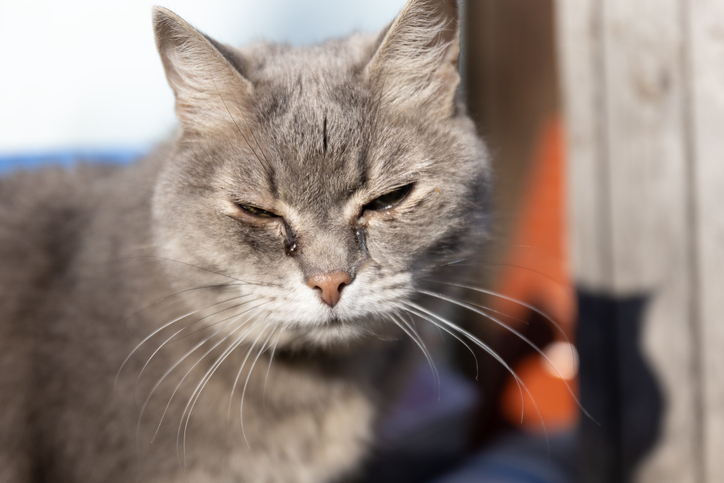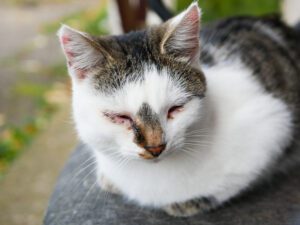Why are my Cat’s Eyes Watering in Amesbury, MA?
Are your cat’s eyes watering? Are you worried about what could be causing her to experience this symptom? Could watery eyes be a cause for concern in cats, or are they not too serious?
Below, you’ll find answers to these questions and more. You’ll be able to learn more about some of the most common causes of watery eyes in cats, and you’ll find out more about which of these causes may be serious, too. Read on to get started.
Allergies
Allergies are the most likely cause of watery eyes in cats. If your cat is allergic to any contaminant in her environment, she may develop watery, itchy, red eyes when she is exposed to that contaminant. Some allergens that may affect a cat’s eyes include cigarette smoke, candle fumes, pollen, and even the dander of other pets.
If your cat has not been officially diagnosed with allergies, go to the vet to be sure this is the cause of her watery eyes. Your vet may recommend allergy medication, but may also recommend simply treating the symptoms as they appear.

Conjunctivitis
Conjunctivitis is one of the most common causes of watery eyes in cats, and it is also one of the most common infections cats develop too. If your cat has recently been around other cats, she may be at a greater risk of developing conjunctivitis from exposure to infected cats. Additionally, conjunctivitis flare-ups can happen throughout a cat’s life.
Conjunctivitis will cause your cat’s eyes to look watery as well as crusty. It may affect one or both eyes, and it will also cause redness around the eye. While conjunctivitis is very contagious among cats, humans cannot catch it from pets.
Eye Ulcers
Eye ulcers are common in cats and typically occur when the cat’s eye is scratched by something, a piece of a broken toy, another cat, or some other environmental factor. If your cat’s eye looks cloudy or milky, and especially if this appearance has come on suddenly, then her eye watering may be associated with an eye ulcer.
Your vet will help you choose the best treatment for your cat’s eye ulcer. In some cases, surgery may be required. However, in most instances, medication and monitoring are the best choices for eye ulcers in cats. The right treatment will depend on the type and severity of the ulcer.
Eye Injury
Eye injuries can lead to watery eyes in cats as well. If your cat has an eye injury, she may not be able to open her eye fully or at all, or you may be able to visibly see signs of the injury by just looking at the eye.
If your cat has an eye injury, this problem needs to be treated by an emergency vet right away. In severe cases, cats may lose the affected eye; however, in most other cases, surgery and medication can help with the underlying injury.

Respiratory Infection
Bacterial and viral respiratory infections in cats may lead to watery eyes. This type of eye watering is often seen along with redness in the whites of the eyes, but may or may not include this symptom. Respiratory infections also typically include other symptoms such as coughing, sneezing, runny nose, and fever.
If you suspect your cat has a respiratory infection, take her to the vet to be checked out. The vet will likely prescribe antibiotics and may also give your cat a round of steroids, depending on the severity and type of her symptoms. She may also need medicated eye drops.
Feline Herpes
Although it may sound serious based on its name, feline herpes is a common problem seen in most cats who have spent time in a shelter or boarding facility. It is a virus that affects a cat’s respiratory system but tends to focus most on the eyes, leading to yellow and sticky discharge.
If you have recently adopted your cat, or if she’s recently stayed in a boarding facility, then she may have been exposed to feline herpes. Talk to your vet to receive oral medication as well as medicated eye drops to help clear up this common issue.
Conclusion
As you can see, most causes of watery eyes in cats are mild to moderate. However, since some are severe, it is important to have this symptom checked out by your vet if it lasts longer than a day or two or is accompanied by other, more serious symptoms.
If you have any questions regarding your cat’s eyes watering, you should always call (978) 388-3074 or book an appointment online to talk with your veterinarian at Merrimac Valley Animal Hospital to discuss it.
Recent Posts
About Us
Merrimac Valley Animal Hospital had humble beginnings in 1968. Dr. Walter Brown opened the animal hospital in a garage next to his home near the current hospital and operated out of this small space until the current building was built in 1969.
